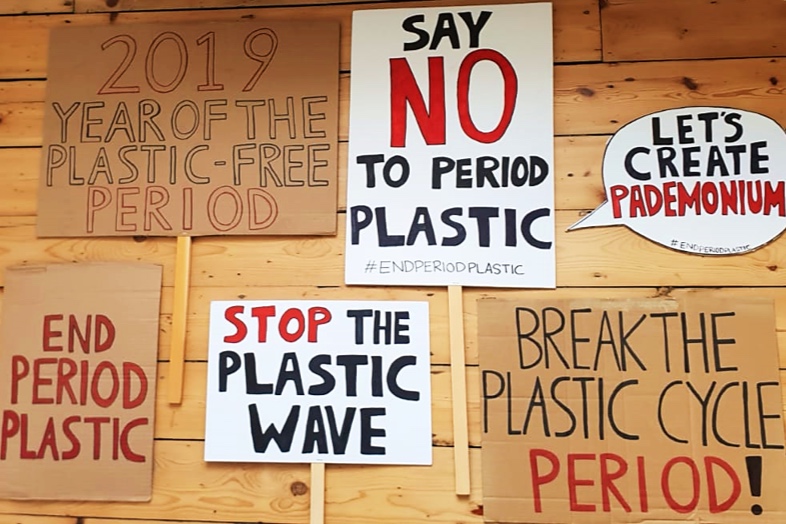5 questions with... Ella Daish
Ella has declared 2019 the Year of the Plastic-Free Period! If you’re not already using planet-friendly period products, you might want to after reading this feature… (and our lovely friends over at OrganiCup have made it even cheaper for our readers with a 20% discount code!)
#GroundswellSeries
Ella is a true eco-warrior leading the movement to #EndPeriodPlastic. Her fight against unnecessary plastics in period products, like tampons and sanitary pads, featured on the Women’s Environment Network, Glamour and even Vogue. To celebrate the one year anniversary of her petition (which has reached over 107k signatures - and counting!) we’re raising our menstrual cups up high and here’s why you should too…
1. Hey, Ella! It was great to meet you at the last Surfers Against Sewage conference in Cardiff! Looks like you’re getting up to a lot with your #EndPeriodPlastic campaign. Please tell us more about you and what you’re doing…
Well, my name is Ella and I’m based in Cardiff, South Wales. In February last year I started a campaign to End Period Plastic, which calls on manufacturers and supermarkets to take responsibility for the unnecessary plastic in their period products, and to make change happen by going plastic-free. In January I declared 2019 as the ‘Year of the Plastic-Free Period’ and, as part of this year of action, I’m calling on the multinational consumer goods company, Procter and Gamble, to stop manufacturing pointless plastic applicators and finally put an end to plastic in Tampax and Always products. I’m passionate about raising awareness and addressing the impact that plastic pollution is having on our environment, oceans and wildlife. Ultimately, I want to make the planet a better place for everyone.
2. You go girl! Scientists now say around 8-12 million tonnes of plastic ends up in our oceans every year. What made you decide to start campaigning on this particular issue?
Last year, the threat of plastic pollution and its adverse effects on the environment gained huge media coverage. Period products are no exception, with people only now becoming aware for the first time (just like me!) that the tampons and pads we’ve been using for years contain high amounts of plastic. This issue is incredibly important because they are being constantly manufactured, used for 4-8 hours, disposed of and then take over 500 years to break down. The harmful impacts they’re having on the environment, oceans and wildlife is completely avoidable, certainly as there are companies who have produced eco-friendly alternatives since the 80’s. Therefore, it’s obvious that the plastic content of conventional period care is unnecessary. I knew I needed to raise awareness and take action to make change happen, which is why I took a stand against period plastic by starting this campaign.
“I knew I needed to raise awareness and take action to make change happen, which is why I took a stand against period plastic by starting this campaign. ”
3. Your campaign names and shames a lot of big, multinational manufacturers and calls time on the way they produce and package their products. How challenging is that?
I’d say the main challenge is getting manufacturers and supermarkets to acknowledge the environmental impacts of the unnecessary plastic they’re putting into their period products. Encouraging them to take responsibility by actively reducing and eliminating plastic from their products is no mean feat. But, with the campaign gaining more awareness and media coverage, and with the number of supporters growing daily, this is putting direct pressure on them to make change happen.
4. But ultimately this requires a change of culture doesn’t it? How do we make women change their own habits and make that switch?
We can encourage people to reduce their plastic consumption by starting conversations and raising awareness of the issues surrounding plastic pollution, as well as highlighting the easy switches we can all make. There are huge, long-term financial benefits to switching to products like refillable water bottles, wash-again make-up wipes, menstrual cups and re-usable pads.
Are you sick of polluting the planet every time you menstruate?
5. What do you think would make the biggest impact?
We’re all becoming increasingly aware of the impact our consumer choices have. I think by making small, simple changes in our lives to reduce our plastic use and live more consciously, we can make the biggest impact. This will also make manufacturers realise how many of us are shunning plastic laden products in favour of eco-friendly alternatives, which will push them to make changes, because if there’s one thing they cannot ignore, it’s consumer demand!
You don’t have to picket or own a megaphone to join the #EndPeriodPlastic movement! Here’s 5 things you can do:
Trade in your pads and tampons now!




